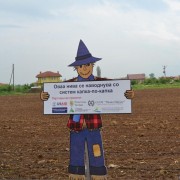Skopje - Today in Negorci village, the Climate Change Caravan organized by the USAID Adaptation to Climate Change in Agriculture (ACCA) project made its second of six stops in rural areas of the country. The Caravan was designed to reach rural communities and educate small farmers and other citizens about the anticipated effects of climate change, share strategies for adapting to these effects, and emphasize the importance of proactive responses to them at the grassroots level.
Skopje - Today, the USAID Small Business Expansion Project launched the Grow More Corn initiative in Pelagonija, a first step towards modernizing corn production in that region. The initiative aims to increase the supply of locally grown feed corn by introducing farming practices that, together with drip irrigation systems, will increase up to four times the yield of corn per hectare. In the Pelagonija region, USAID is partnering with most of the region’s municipalities to carry out this initiative.
Skopje - Today, the Climate Change Caravan, organized by the USAID Adaptation to Climate Change in Agriculture(ACCA) project, started on its journey across Macedonia. The Caravan will make six stops in rural areas of the country, with Novo Selo village in Strumica as its first. The Caravan was designed to reach rural communities and educate small farmers and other citizens about the anticipated effects of climate change, share strategies for adapting to these effects, and emphasize the importance of proactive responses to them at the grassroots level.
Skopje - Today, the USAID Interethnic Integration in Education Project, together with Primary School Zivko Brajkovski and the Municipality of Butel, celebrated the completion of renovations at the school. The process of refurbishment, financially supported by United States European Command (EUCOM) and USAID, created a better learning environment for interethnic integration in education.

Skopje - Today, the USAID Small Business Expansion Project launched the Grow More Corn initiative, a first step towards modernizing corn production in Macedonia. The initiative aims to increase the supply of locally grown feed corn by introducing better seed varieties and farming practices that, together with drip irrigation systems, will increase up to four times the yield of corn per hectare.
Skopje - Today, the USAID Interethnic Integration in Education Project, together with Primary Schools Liria and Bratstvo Migjeni and the Municipalities of Bogovinje and Tetovo, celebrated the completion of renovations at these schools. The process of refurbishment, financially supported by United States European Command (EUCOM) and USAID, created a better learning environment for interethnic integration in education.
Skopje - Today, USAID launched the Project for Investigative Journalism and Cooperation Between Media and Civil Society as part of USAID’s efforts to strengthen independent media in Macedonia. The project aims to improve cooperation between journalists and civil society through a series of debates and workshops, and will contribute towards more independent investigative stories by offering journalists small grants and mentorships for investigative stories.
Skopje - On Friday April 5, in honor of the International Roma Day, USAID Macedonia Mission Director Robert Wuertz visited the Dendo Vas Center for Educational Support for Roma in Gorce Petrov Municipality. This Center, together with three other centers in Prilep and Kumanovo, has been part of the USAID Roma Education Project since 2004. Every year, the project provides assistance to around 200 preschool-age children to better prepare them for entering primary school.
Skopje - Today, the USAID Equal Access for Equal Opportunities project held the conference “For e-Accessible Primary Schools: Assistive Technology in Primary Education in Macedonia.” The conference brought together representatives of national and local educational authorities, disability-focused NGOs, as well as numerous practitioners: school directors, teachers, parents, and students with first-hand experience in using assistive technology in school. Participants agreed that assistive technology, such as big-button keyboards, trackballs and joysticks, widens the educa








Comment
Make a general inquiry or suggest an improvement.